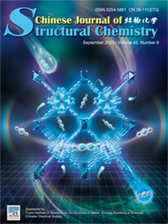
Cover Picture
Metal-ion-tuned metal-organic frameworks for C2H2/CO2 separation
Meng Sun, Hongyan Liu, Xiaokang Wang, Xinlei Yang, Fei Gao, Deyu Xie, Weidong Fan*, Yinfeng Han*, Ben Xu, Daofeng Sun Submit a Manuscript
Metal-ion-tuned metal-organic frameworks for C2H2/CO2 separation
Meng Sun, Hongyan Liu, Xiaokang Wang, Xinlei Yang, Fei Gao, Deyu Xie, Weidong Fan*, Yinfeng Han*, Ben Xu, Daofeng Sun Submit a Manuscript
Machine learning promotes the development of all-solid-state batteries
Yong Qiu, Xu Zhang, Yun Tian*, Zhen Zhou
Chin. J. Struct. Chem., 2023, 42: 100118. DOI: 10.1016/j.cjsc.2023.100118
September 15, 2023
Machine learning; Solid-state batteries; Performance prediction; Big data
ABSTRACT
Lithium-ion batteries (LIBs) are a promising energy storage system for green energy applications. However, the use of liquid electrolytes in LIBs results in safety and lifespan issues. To address these challenges, researchers have been focusing on the development of all-solid-state batteries that use solid electrolytes. Unfortunately, traditional methods are time-consuming and expensive for exploring solid-state batteries, limiting their ability to keep up with growing social demand. In recent years, the development of big data has opened up new avenues for materials discovery, allowing for large-scale materials screening through computer simulations and machine learning models that can disclose the structure-activity relationship of materials. This review provides an overview of the basic procedures and common algorithms used in machine learning for designing solid-state batteries, with particular emphasis on recent research progress in applying machine learning to cathode materials and solid electrolytes, as well as predicting the condition of solid-state batteries. Additionally, this review offers a brief outlook on the challenges and opportunities facing machine learning methods in the realm of solid-state batteries.







